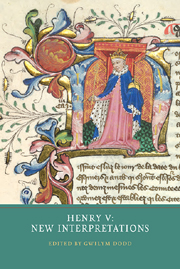Book contents
- Frontmatter
- Dedication
- Contents
- Preface and Acknowledgements
- List of Contributors
- Abbreviations
- Introduction
- 1 The Making of a Prince: The Finances of ‘the young lord Henry’, 1386–1400
- 2 Henry V's Establishment: Service, Loyalty and Reward in 1413
- 3 Henry V, Lancastrian Kingship and the Far North of England
- 4 Henry V's Suppression of the Oldcastle Revolt
- 5 Religion, Court Culture and Propaganda: The Chapel Royal in the Reign of Henry V
- 6 ‘Par le special commandement du roy’. Jewels and Plate Pledged for the Agincourt Expedition
- 7 Henry V and the Cheshire Tax Revolt of 1416
- 8 Henry V and the English Taxpayer
- 9 Henry V, Flower of Chivalry
- 10 War, Government and Commerce: The Towns of Lancastrian France under Henry V's Rule, 1417–22
- 11 Writing History in the Eighteenth Century: Thomas Goodwin's The History of the Reign of Henry the Fifth (1704)
- Index
- York Medieval Press: Publications
1 - The Making of a Prince: The Finances of ‘the young lord Henry’, 1386–1400
Published online by Cambridge University Press: 05 July 2013
- Frontmatter
- Dedication
- Contents
- Preface and Acknowledgements
- List of Contributors
- Abbreviations
- Introduction
- 1 The Making of a Prince: The Finances of ‘the young lord Henry’, 1386–1400
- 2 Henry V's Establishment: Service, Loyalty and Reward in 1413
- 3 Henry V, Lancastrian Kingship and the Far North of England
- 4 Henry V's Suppression of the Oldcastle Revolt
- 5 Religion, Court Culture and Propaganda: The Chapel Royal in the Reign of Henry V
- 6 ‘Par le special commandement du roy’. Jewels and Plate Pledged for the Agincourt Expedition
- 7 Henry V and the Cheshire Tax Revolt of 1416
- 8 Henry V and the English Taxpayer
- 9 Henry V, Flower of Chivalry
- 10 War, Government and Commerce: The Towns of Lancastrian France under Henry V's Rule, 1417–22
- 11 Writing History in the Eighteenth Century: Thomas Goodwin's The History of the Reign of Henry the Fifth (1704)
- Index
- York Medieval Press: Publications
Summary
With such high levels of success as king as well as a substantial apprenticeship as Prince, it is easy to overlook the fact that Henry V was not born into the royal purple. Until his circumstances changed around the time of his thirteenth birthday in the autumn of 1399, his future was that of a peer. Even though his long-term prospects were promising – he was heir not only to his paternal Lancaster inheritance, but also to a share of that of the Bohuns through his co-heiress mother – he would have had to wait to enjoy these resources. In the shorter term, therefore, he was a landless youth dependent upon the financial support of his family.
His life and his financial resources were transformed by his father's usurpation of the throne. On 15 October 1399, two days after the coronation of Henry (Bolingbroke), the young Henry was created Prince of Wales, duke of Cornwall and earl of Chester, and was acknowledged as heir to the throne should his father die. On 23 October the title duke of Aquitaine was added, and on 10 November that of duke of Lancaster. With the first group of titles went a substantial landed endowment defined by precedent – the earldom of Chester; the principality of Wales, which fell into two groups of counties in North and South Wales; and the south-western lands of the duchy of Cornwall, as well as its ‘foreign manors’ outside Devon and Cornwall which comprised scattered holdings in the midlands and south of England.
- Type
- Chapter
- Information
- Henry VNew Interpretations, pp. 11 - 34Publisher: Boydell & BrewerPrint publication year: 2013



